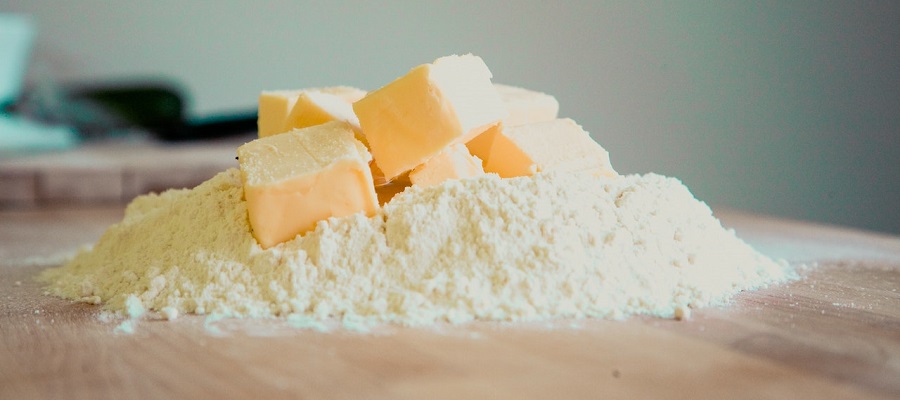It is not necessarily accurate to say that one is "better" than the other, as it depends on the specific context and the specific types of butter and oil being compared. Both butter and oil have their own unique properties and can be used in different ways in cooking and baking.
Butter is a solid fat made from the churning of cream. It is often used as a spread, in cooking and baking, and as a flavor enhancer. Butter is a good source of fat-soluble vitamins and is high in saturated fat, which can raise cholesterol levels if consumed in excess.
Oil is a liquid fat that is usually extracted from plants. It is often used as a cooking medium, in dressings and sauces, and as a flavor enhancer. Different types of oil have different flavor profiles, smoke points, and nutritional profiles. Some types of oil, such as olive oil and avocado oil, are high in monounsaturated fat, which is associated with heart health benefits when consumed in moderation. Other types of oil, such as coconut oil and palm oil, are high in saturated fat and should be consumed in moderation.
Ultimately, the choice between using butter or oil in cooking or baking will depend on the specific recipe and the desired flavor, texture, and nutritional profile of the finished dish. It is generally recommended to consume all types of fat in moderation as part of a balanced diet.
When to use butter and not oil?
Here are some factors to consider when deciding whether to use butter or oil in cooking or baking:
-
Flavor: Butter has a distinct, rich flavor that can add depth and complexity to dishes. It is often used in baking to add flavor to cakes, cookies, and other baked goods. Oil, on the other hand, is generally flavorless and is often used as a cooking medium to prevent sticking and to add moisture.
-
Texture: Butter can add a creamy, smooth texture to dishes and is often used in sauces and spreads. Oil, on the other hand, can add a lighter texture and can be used to coat or marinate foods.
-
Nutritional profile: Butter is high in saturated fat, which can raise cholesterol levels if consumed in excess. Some types of oil, such as olive oil and avocado oil, are high in monounsaturated fat, which is associated with heart health benefits when consumed in moderation. Other types of oil, such as coconut oil and palm oil, are high in saturated fat and should be consumed in moderation.
-
Smoke point: The smoke point is the temperature at which an oil begins to break down and release smoke. Different types of oil have different smoke points, and it is important to choose an oil with a high smoke point for high-temperature cooking methods such as frying. Butter has a relatively low smoke point and is not well-suited for high-temperature cooking.
Ultimately, the choice between using butter or oil in cooking or baking will depend on the specific recipe and the desired flavor, texture, and nutritional profile of the finished dish. It is generally recommended to consume all types of fat in moderation as part of a balanced diet.
Side effects of using the oil and butter heavily
Consuming excessive amounts of any type of fat, including butter and oil, can have negative health effects. Here are some potential side effects of consuming large amounts of butter or oil:
-
Weight gain: Butter and oil are high in calories and can contribute to weight gain if consumed in excess.
-
Heart health: Both butter and oil can affect heart health, but the specific effects depend on the type of fat they contain. Butter is high in saturated fat, which has been linked to an increased risk of heart disease when consumed in excess. Some types of oil, such as olive oil and avocado oil, are high in monounsaturated fat, which may have a protective effect on heart health when consumed in moderation. Other types of oil, such as coconut oil and palm oil, are high in saturated fat and may increase the risk of heart disease when consumed in excess.
-
Diabetes: Consuming large amounts of any type of fat, including butter and oil, may increase the risk of developing type 2 diabetes.
It is generally recommended to consume all types of fat in moderation as part of a balanced diet. This includes choosing unsaturated fats, such as olive oil and avocado oil, over saturated fats like butter and coconut oil, and limiting overall intake of added fats and oils.
Alternatives of oil and butter
There are many alternatives to butter and oil that can be used in cooking and baking. Here are a few examples:
-
Applesauce: Applesauce can be used in place of oil or butter in baking to add moisture and flavor.
-
Avocado: Avocado can be mashed and used as a spread or as a replacement for butter in recipes.
-
Greek yogurt: Greek yogurt can be used in place of butter or oil in baking to add moisture and a creamy texture.
-
Mashed bananas: Mashed bananas can be used in place of butter or oil in baking to add moisture and sweetness.
-
Nut butters: Nut butters, such as peanut butter or almond butter, can be used as a spread or as a replacement for butter in recipes.
-
Plant-based oils: There are many types of plant-based oils that can be used in place of butter or other oils in cooking and baking, including olive oil, avocado oil, and coconut oil.
It is important to note that while these alternatives may be lower in fat or calories than butter or oil, they should still be consumed in moderation as part of a balanced diet.


